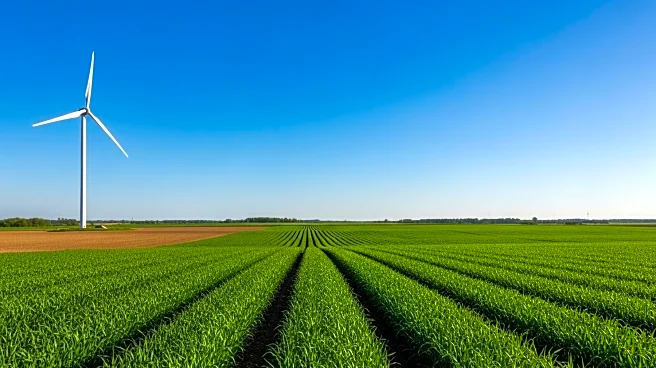What's Happening?
The global sustainable agriculture market is anticipated to grow significantly, reaching a value of $31.56 billion by 2032, according to a report by DataM Intelligence. The market, valued at $14.31 billion in 2024, is expected to expand at a compound annual growth rate (CAGR) of 10.39% from 2025 to 2032. Sustainable agriculture focuses on meeting current food and resource needs while preserving the environment, supporting farm profitability, and ensuring long-term agricultural productivity. Key practices include crop rotation, organic farming, efficient water use, integrated pest management, and renewable energy adoption. Major players in the market include Bayer AG, Corteva Agriscience, Syngenta Group, BASF SE, and others. Recent developments in the U.S. include investments by Chipotle and Sweetgreen to support local farmers, and a $152 million USDA investment package for rural development projects in Iowa.
Why It's Important?
The growth of the sustainable agriculture market is crucial for addressing environmental challenges and ensuring food security. As the industry expands, it supports the adoption of practices that reduce environmental impact and enhance farm profitability. This growth is significant for stakeholders such as farmers, agri-tech companies, and policymakers who are focused on sustainable development. The market's expansion reflects a broader trend towards environmentally responsible farming, which is essential for mitigating climate change and preserving natural resources. The investments and initiatives by major companies and government agencies highlight the increasing importance of sustainable agriculture in economic and social policy.
What's Next?
The sustainable agriculture market is expected to continue its growth trajectory, driven by technological advancements and increased investment in sustainable practices. Key players are likely to expand their operations and partnerships to capitalize on emerging opportunities. The U.S. government and private sector may further invest in infrastructure and technology to support sustainable farming. As the market evolves, stakeholders will need to navigate challenges such as regulatory changes and market volatility. The focus on sustainability is expected to drive innovation and collaboration across the industry, leading to new solutions for environmental and economic challenges.
Beyond the Headlines
The shift towards sustainable agriculture has deeper implications for global food systems and environmental policy. It represents a move towards more resilient and adaptive farming practices that can withstand climate-related disruptions. The emphasis on sustainability also aligns with broader societal goals of reducing carbon footprints and promoting biodiversity. As sustainable agriculture becomes more mainstream, it may influence consumer behavior and demand for eco-friendly products. This transition could lead to long-term shifts in agricultural supply chains and global trade patterns, impacting economies worldwide.









